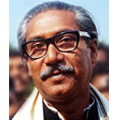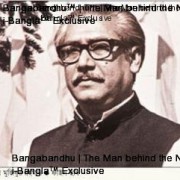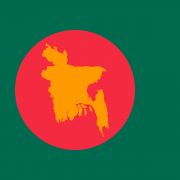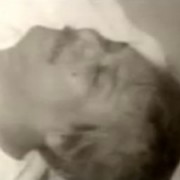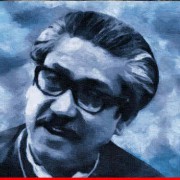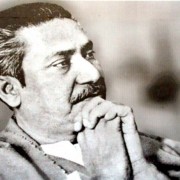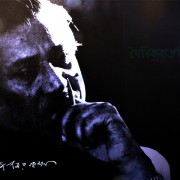Portrait of a patriot
Bangabandhu Sheikh Mujibur Rahman was born on March 17, 1920 at Tungipara in the then Faridpur district. Despite the fact that he was an extraordinary political leader who had spent more than twelve years in jail for articulating the legitimate grievances of his people against the then Pakistani ruling elite, he became a victim of a brutal massacre on August 15, 1975. The bullet-ridden dead body of the Father of the Nation was most dishonourably buried by the murderers at Tungipara.
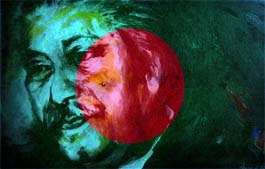 Although our indebtedness to Bangabandhu Sheikh Mujibur Rahman is immense, his name had been officially proscribed for almost three decades, with the exception of those years (1996-2001) when the Awami League formed the government under the leadership of Sheikh Hasina.
Although our indebtedness to Bangabandhu Sheikh Mujibur Rahman is immense, his name had been officially proscribed for almost three decades, with the exception of those years (1996-2001) when the Awami League formed the government under the leadership of Sheikh Hasina.
Bangabandhu was the saviour of Bangalees of the then East Pakistan. Yet his name has become an object of a systematic vilification and disinformation campaign for over more than thirty years. This extraordinarily charismatic leader became a victim of those reactionary and mercenary forces who had never accepted his clarion call for independence. National documents and school texts were doctored to delete or distort Bangabandhu’s central role in the emergence of Bangladesh as a nation-state.
For instance, it is alleged by the critics that Bangabandhu had no plan for having an independent Bangladesh. According to them, Bangabandhu had never declared independence. They also claim that the creation of Bangladesh was the direct result of a series of blunders and wrong decisions made by advisors of the then dictator Yahya Khan and power greedy Zulfiqar Ali Bhutto.
Some of those critics also floated the idea that Bangabandhu did not care to ascertain what was going on in the then East Pakistan before the Pakistani military junta unleashed gruesome genocide on the night of March 25, 1971. These motivated critics also maintain that neither the Awami League nor Bangabandhu was pivotal in leading our struggle towards independence. In what follows, the main intent is to repudiate such fraudulent claims.
It needs to be underscored that no fair-minded individual can ever claim that Bangabandhu Sheikh Mujibur Rahman was beyond or above criticism. History will ultimately cast judgment on Bangabandhu’s life-long struggle and his accomplishments as a political leader. Unfortunately, most of the criticism about the Founder of Bangladesh is nothing but vilification.
The truth of the matter is that the emergence of Bangladesh as a nation-state was the direct outcome of our determination for carving an independent country out of Pakistan. Bangladesh was the outcome of Bangalees’ willingness to fight for their freedom and independence. It is a documented fact that Bangabandhu Sheikh Mujibur Rahman provided the much needed charismatic leadership for our glorious struggle for emancipation and independence.
Bangabandhu’s name is synonymous with Bangalees’ struggle for independence. Even a quisling of Ghulam Azam’s stature can hardly question Bangabandhu’s pivotal contribution towards Bangladesh’s independence. The White Paper on East Pakistan Crisis, which was prepared by the Pakistani military regime during Pakistan’s genocidal war in 1971, had clearly pinpointed that Bangabandhu had refused to compromise on the six-point program during the political negotiations in March 1971. It was also emphasised that Bangabandhu was in total control of the non-cooperation movement that was launched after March 7, 1971.
In his book, The Last Days of United Pakistan, Dr. G.W. Chowdhury (now deceased), a die-hard proponent of pre-1971 Pakistan, verified that Bangabandhu consistently refused to compromise his demands for full autonomy based on the six-point program. Recently published books written by numerous Pakistani scholars and civil servants clearly recognised that it was Bangabandhu who had adamantly refused to compromise his six-point program after the general elections of 1970.
In their recently published memoirs, Abdullah Niazi and Rao Forman Ali vehemently criticised Bangabandhu for his uncompromising stand on his six-point program. A host of outstanding British and American scholars and journalists fully recognised the pivotal role of Bangabandhu’s charismatic leadership in Bangladesh’s struggle for independence.Although some celebrated Bangladeshi political scientists are very critical about Bangabandhu’s performance as the head of the government in Bangladesh (1972-’75), there is near unanimity among them about Bangabandhu’s monumental role in uniting all Bangalees at a critical juncture of our history for waging and sustaining an armed liberation struggle.
It is preposterous to claim that Bangabandhu did not know what was going on in the then East Pakistan before and during March 1971. If Bangabandhu was unaware of the political development in then eastern province of Pakistan then who knew what was going on in there March 1971?
It seems that these Bangabandhu-bashers allude to the idea that the Jamaati leader Ghulam Azam, Pakistan Democratic Party (PDP) leaders Nurul Amin, Hamidul Hoque Chowdhury and Mahmud Ali, and the Muslim League leaders Khan A. Sabur Khan, Khwaja Khairuddin and Fazlul Quader Chowdhury were the real defenders of Bangalees’ legitimate rights in 1971, even though the entire world knew that those certified pro-Pakistani quislings had systematically tormented and persecuted the Bangalees during our liberation war. It is unfortunate that many of those anti-liberation forces claim that the collaborators of the Pakistani regime were the true patriots of Bangladesh!
In view of this, no pro-Jamaati elements of Bangladesh, or Pakistani collaborators or sympathisers of Pakistani war criminals, are in a credible position to verify who had supported or fought for our liberation. Or for that matter, the admirers of military dictators or the supporters of the Jamaat or other rightist parties are not the credible persons to attest to the role of the Awami League or Bangabandhu in the emergence of Bangladesh as an independent nation.The struggle for our freedom did not start all of a sudden on the black night of March 25, 1971. It is totally false to allude to the idea that the restive Bangalees of the then East Pakistan were waiting for a call from an unknown major of the Pakistan army to wage a liberation war. The objective reality was that the actual fighting for our liberation had already started in many places of Bangladesh immediately after Pakistani military forces started the genocidal attack on our people on the black night of March 25, 1971.
The restive Bengali-speaking people of then East Pakistan were ready to resist the Pakistani occupation forces, and they heard what Bangabandhu had to say in his historic speech on the tumultuous seventh day of March in 1971: “The struggle this time is the struggle for our emancipation. The struggle this time is the struggle for our independence.” Indeed, Bangladesh’s struggle for freedom and independence was in the making for a long time.
The emergence of Bangladesh on December 16, 1971 was the culmination of a long struggle of our people. The malicious propaganda against Bangabandhu and the selective distortions of our political history are at sharp variance with most of the universally accepted facts. Bangabandhu is not only part and parcel of our political history but was also the maker of that glorious and robust history.
It was the dynamic and charismatic leadership of Bangabandhu that led us through the historic six-point movement in 1966. By mid-1960s, it was crystal clear to the Bengali-speaking people of the then Pakistan that the Awami League and its leader Sheikh Mujibur Rahman were the true instruments and expressions of articulating their genuine demands and grievances. It was the Awami League under the inspiring leadership of Bangabandhu that had earned the electoral mandate in the general elections in 1970 from an extraordinary majority of Bangalees of the then East Pakistan.
In fact, after December 1970 general elections, especially after March 1, 1971, Bangabandhu had undeniably symbolised the entire Bangalee population of the then eastern wing of Pakistan even though he was the President of the Awami League. Although our liberation war was a people’s war by any definition, the Awami League led our Muktijuddha. It was the top Awami League leadership which had legitimately formed the Bangladesh government-in- exile.
Our liberation war was fought in Bangabandhu’s name. In the absence of Bangabandhu during our liberation war, it was Tajuddin Ahmed, the dynamic prime minister of the Bangladesh government-in-exile, who had successfully led our Muktijuddha. It was Bangabandhu’s inspiration and Tajuddin Ahmed’s competent leadership that led us to our decisive victory over the brutish Pakistani forces on December 16, 1971. These are independently verified and fully validated historical facts.
No amount of distortions can change the fundamental fact that it was Bangabandhu who had first formally declared independence for Bangladesh on March 26 (immediately after midnight of March 25, 1971). The original Constitution of the Republic and all other relevant documents have affirmed that Declaration of Independence. Doubtless, there were very capable leaders in the caliber of Tajuddin Ahmed and Dr. Kamal Hossain in the then Awami League. There were many dedicated political leaders in the Awami League both before and during our liberation war. Yet it was Bangabandhu who was the unifier of all Bangalees of the then East Pakistan in 1971. It was Bangandhu alone who was the sole spokesman of the entire Bangalee people of the then East Pakistan. It was Bangabandhu’s inspiring speech of March 7, 1971 speech that lit the torch of freedom for his people from the subjugation of the oppressive and repressive occupation forces of Pakistan.
The coup d-etat of August 15, 1975, in which Bangabandhu was brutally murdered and his elected government overthrown along, with the subsequent political developments in Bangladesh were not as surprising as they seemed to the outside world. The assassination of the Father of the Nation along with his family members was one of the cruelest political murders in human history. This ghastly killing and its aftermath, littered with illegal seizures of state powers through coups, blackmails, and counter-coups, have been characterised by some observers of Bangladesh politics as the direct result of the manner in which politics and administration of the new nation were managed.
There is no doubt that the perceived failure of his leadership in the post-liberation period can be linked to numerous causal factors. We are often allured to the idea that Bangabandhu “lost out’ partly because the situation in the early years of independent Bangladesh was so desperate but mainly because he failed to translate his charisma and tremendous popularity into an efficient and effective government.
Yet if we look back, it is fair to suggest that Bangabandhu’s accomplishments as the head of the government of a newly established country were of monumental proportions. Despite the seething criticisms of his elected regime of only three and a half years, Bangabandhu has remained synonymous with Bangalees’ relentless struggle for freedom and independence.
Aimed at banishing the Founding Father from the pages of our history and the memories of our people, deliberate attempts were made by various regimes (Mustaque-Zia-Ershad-Khaleda) during the post-1975 era. Yet Bangabandhu’s pivotal role in the emergence of Bangladesh as a sovereign nation-state couldn’t be washed away from the memories of his people. Notwithstanding the alleged mismanagement of the economy and administrative machinery in early years of our independence, the role of Bangabandhu in igniting our struggle for freedom and independence can never be marginalized. Bangabandhu’s name has remained enshrined and engraved in the minds of our people as the emancipator and saviour of the Bangalees. The immortal name of Bangabandhu Sheikh Mujibur Rahman and the legacy of his extraordinary accomplishments will live through ages.
Dr. M. Waheeduzzaman (Manik) writes from the city of Clarksville, Tennessee, USA where he is a Professor and the Chair of the Department of Public Management and Criminal Justice at Austin Peay State University.
Author – M. Waheeduzzaman Manik

